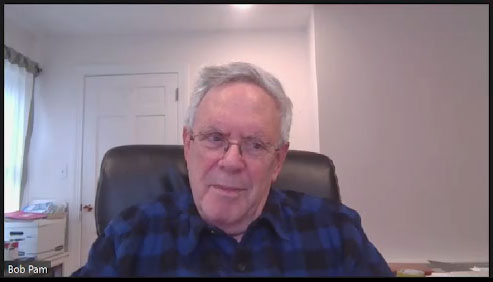Opinion: I See No Reason to Hope That the Jones Expansion Project Will Become Affordable

Photo: istock
Trustee Raises Alarm over Letter from Library Consultant Smearing Project Opponents
Outgoing Jones Library Trustees Treasurer Bob Pam offered this statement at the Trustees’ meeting on Mary 20, 2024. The statement was made just prior to a vote on a motion to send a letter to the Massachusetts Board of Library Commissioners requesting an extension on their June 2024 deadline for beginning construction on the $55 million demolition and expansion project. The motion passed 4-1 with Pam being the lone dissenting vote.

This week the huge increase in price on the expansion project brought the expected support letters for continuing the effort in hopes that correspondingly huge changes will occur to make the project feasible. I hoped that at this meeting we would hear from the Capital Campaign that a coalition of wealthy contributors have pledged $5 million in new funds to the project. Absent that, I don’t see how continuing for six more months and the expenditure of probably another $250,000 on redesign and fundraising will produce an affordable project.
Let me reiterate what I said last week. From December, when the Council approved a $46 million project, to May 1, basically before the bid was opened, new contributions – the new funds that I was then told would be generously released to end uncertainty about the project – totaled $425,000. Of that sum, $250,000 came from Amherst College as the first of four annual payments. Local, non-institutional gifts averaged $35,000 per month during these five months. We had needed an average of $100,000 per month from local sources to meet our goals. Now that the bid price has risen more than $6 million, the monthly goal has at least doubled. The project is again uncertain at best. What will change for the Capital Campaign in the next six months? Will new funds come pouring in? I don’t see that happening.
I can’t see relying on the bidders to reduce their prices as our solution. They too, see uncertainty on the timing or actuality of the project as a cost to be incorporated in their bids. And after years of saying that the design is “lean and mean” can it now be rejiggered in three months to create a final, biddable scope of work that would cut out several million dollars in costs – without deferring some large items to some future funding source yet to be determined? That is an interesting proposition.
Design decisions on the project have not been beyond questioning or debate – I have asked some of those questions myself. When the approved budget for landscaping rose from about $400,000 to about $2 million I questioned it. I have asked about many of the design decisions – sometimes for practical or aesthetic reasons, sometimes for cost. My main concern has always been the library’s ability to function properly if shortfalls in fundraising became too large, and that either paying the shortfall from the corpus of our endowment or by borrowing to cover it, and then paying debt service on it, would reduce operating funds below our needs. I believe the risk is no longer acceptable.
The size of the bid has also brought the expected letters of opposition to continuing the project. That is neither surprising nor inappropriate. Whether the concern is about its impact on the town budget, other capital projects, personal tax rates, or its impact on the library, people have a right and duty to engage in discussion about a civic project. Supporters of the project were encouraged to write; so have been opponents. This is a major undertaking of the town and it is worth all of the attention it receives.
It is how we, as a library, respond to criticism that now concerns me. The library has committed itself to implementing policies supporting diversity, equity and inclusion. That is right. But this support must also include inclusion of opinion, diversity of judgment, equity in treatment. We need to not just allow speech, but hear it, listen to it, engage with it, with openness and respect. In the end disagreements are inevitable, but they can’t, they mustn’t end with rejection of the speaker. I have usually received this response to my often contrary views here on the Board, and I appreciate it.
I raise this because a strong supporter of the library chose to ascribe project opposition and delays in a widely distributed support letter to mudslinging, falsehoods, and rumor mongering. Because the writer is also a consultant to the library it was taken as reflecting the views of the library, although he stated that he was writing only for himself. Frankly, his comments were destructive to the unifying values and the immediate interests of the library. It would be helpful if we, as a board, make it clear that we do not agree with such characterizations.
So, in summary, I do not support the motion to seek six more months of review. I vote no.
Robert Pam is the outgoing treasurer of the Jones Library Trustees.

My hope is that the writer of the letter to which Bob Pam refers will disavow that portion which is, as Bob says, so destructive and calumnious. For the record, although I was not named in the letter I stand with those who were named with pride and gratitude for their meticulous reporting and, as with Bob, their many years of support for the Jones Library.
While I think the size, the cost, and the priority given to this project were all mistaken there are no villains in Amherst. It’s time for a deep breath and sitting down together – trustees, councilors, institutions and critics – and re-examine the purposes, holdings and programs of the Jones Library and its branches in a library-rich town. I don’t expect the MBLC to be helpful in such an examination, but surely those who have donated or pledged to this project should be invited to participate in its re-imagining. The way forward need not be contentious.
Michael raises an interesting point — there are two large libraries within a mile of the site, and Hampshire’s a few miles further down the road. UMass extends borrowing privileges to any resident of the Commonwealth, which includes all Amherst adults, not sure about children.
What are the purpose of having a library there under such circumstances? What can or does it do better than the UM Tower Library does? Whom does it serve that the Tower Library can’t or won’t? And how/should it do the aforementioned better than the Tower Library?
I seem to remember 1929 as the build date of the Amherst town library. The UM Library would be in the Old Chapel until the front half of Goodell was built in 1935, and then the western addition added in 1959, with the library moving to its current location in 1973. I don’t know what Amherst College had for a library at the time.
But back in 1929 there was a real need for a town library, there probably was until 1959 when the bigger part of Goodell was built. But now, with a 27 story down the street?
So what is it that you want it to do? I think you need to answer that question….
To a person the former trustees of the library (and their surviving spouses) during the Bonnie Isman era were unanimously against this project and have led the charge to please repair and restore the 1928 and 1993 structures including the ground source HVAC which Bob Pam very wisely urges along with former trustee Sarah McKee, who has pushed for about fifteen years.
I am sure this work can be done using the bonding already approved by the Council along with the funds raised by Jones trustees. Give the State back their $16M or ask to fund a smaller project. We don’t need the State to do the right thing.